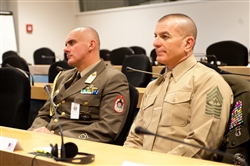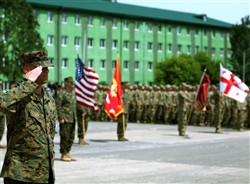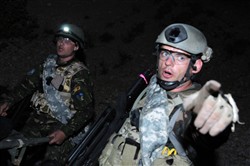EUCOM senior enlisted seminar hits its mark
Senior Enlisted Advisor to the Chairman of the Joint Chiefs of Staff, Sgt. Maj. Bryan Battaglia (right), and Senior Enlisted Leader of the Hungarian Defense Force, Command Sgt. Maj. Istvan Kriston, listen to a briefing given at the 2012 International Senior Enlisted Seminar (ISES), Sept. 6. Held at the George C. Marshall European Center for International Studies in Garmisch, Germany, ISES is the flagship professional development event for NATO, Partnership for Peace and key contact nation senior enlisted leaders, helping to prepare them for increasingly complex and challenging multinational environments, while continuing the development of a professional NCO Corps in NATO and partnered countries.
Related Topics (3)
More related topics
STUTTGART, Germany – When Hungarian Command Sgt. Maj. Istvan Kriston heard senior noncommissioned officers from Balkan nations brief their plans for NCO development during the International Senior Enlisted Leader Seminar, he smiled.
Their strategy, to strengthen a strong corps of enlisted leaders among forces in Croatia, Bosnia and Herzegovina and Macedonia, sounded a lot like Kriston’s own NCO development plan for Hungary’s defense force, where he serves as his military’s senior enlisted leader.
“During their presentation, I saw they had the same mind set,” Kriston said, who has worked on NCO development strategy for a several years. “When I saw exactly the same words as our vision, my heart warmed up. I knew we were doing something great.”
ISES, a weeklong U.S. European Command event held at the George C. Marshall European Center for Security Studies in Garmisch-Partenkirchen, Germany, concluded on Sept. 13. Begun in 2005, ISES broadens professional development of senior enlisted leaders by exposing them to a variety of topics that impact NATO nations and EUCOM’s area of responsibility, said Fleet Master Chief Roy Maddocks Jr., EUCOM’s senior enlisted leader. Some topics focused on countering radical extremism. Other sessions focused on NCO development.
Many European militaries are currently strengthening their NCO Corps – a goal that both U.S. and NATO leaders see as a significant step toward civil-military reform. NCOs form the backbone of the modern military and serve as the bridge between planning and executing all military operations, Maddocks said.
“Much time and resources have been devoted to assisting our allies and partners in the development of their NCO Corps, and our efforts have paid dividends,” Maddocks recently wrote in a EUCOM blog post. “We are continuing our work to hone the abilities of a key element of the NATO NCO corps—our top senior enlisted leaders—via the annual International Senior Enlisted Leader Seminar.”
This year, senior enlisted leaders from 36 nations took part, “the most diverse group in seminar history,” Maddocks said. Also attending were 22 senior enlisted leaders from the U.S. National Guard Bureau’s State Partnership Program – one of EUCOM's most effective security cooperation efforts – which links U.S. states with partner countries to enhance capabilities and improve interoperability.
“Bringing together these diverse backgrounds creates an environment where each individual's experience and knowledge broadens the perspective of all who attend, as well as paves the way for much greater cooperation in the future,” Maddocks said.
Speaking via video teleconference, Adm. James Stavridis, the Commander of U.S. European Command and NATO Supreme Allied Commander Europe, offered a senior leader perspective. Command Sgt. Maj. Thomas Capel, the senior enlisted leader at the International Security Assistance Force offered an update from ISAF’s mission in Afghanistan.
Kriston, 40, began his service as conscript and spent much of his career in long range reconnaissance. In 2008, he graduated from U.S. Army Sergeants Major Academy at Fort Bliss, Texas. The ISES topics were enlightening, he said, and offered information he will take back to improve Hungary’s forces.
Hungary supports allied military efforts in Kosovo, Afghanistan and on the African continent. The central European nation also maintains a state partnership with the Ohio National Guard. Hungary’s Papa Airbase is home to a heavy airlift wing comprised of 12 partner nations.
In the past, Hungary maintained a heavy Warsaw Pact force. Now, they have move to a lighter, versatile NATO force – which includes growing its corps of enlisted leaders, Kriston said. Discussions at ISES offered new ideas that will help, he said.
“We are building strong, concrete bridges between nations in the alliance” Kriston said. “We are building bridges to the future.”
Find more articles tagged with:
- Senior Enlisted Leader
- National Guard
- conference
- State Partnership Program
- professional development
- NATO
- George C. Marshall Center
- noncommissioned officer
-

USACE forward engineers train with Italians
A U.S. Army Corps of Engineers Forward Engineering Support Team-Advance (FEST-A) conducted training and remote engineering missions in partnership with Italian Army Reconnaissance Engineers here September 9-21, 2012.Find more articles tagged with:
-

EIAMDC officially opens
The Warrior Preparation Center opened the European Integrated Air and Missile Defense Center with a ribbon cutting ceremony here Sept. 26.Find more articles tagged with:
-

Schweinfurt flexes combat capability muscle with NATO exercise
Despite its announced closure earlier this year, the U.S. Army garrison here still has something to prove: Pitted between closing and remaining operational, it can also host a large-scale NATO exercise in its own backyard.Find more articles tagged with:
-

Kansas National Guard partners with HDTC for Humanitarian Demining in Armenia
Four soldiers from the Kansas National Guard are working with a civilian representative from the U.S. Humanitarian Demining Training Center to teach international Humanitarian Mine Action standards to members of the Engineering Companies of the Armenian Peacekeeping Brigades Sept. 18-28.Find more articles tagged with:
-
Jackal Stone 2012 participants take cultural tour of Croatia
Military personnel from 11 NATO-member nations took part in a tour of the Krka National Park located along the Krka River in Croatia on Sept. 15, 2012.Find more articles tagged with:
-

81st FS plays critical role in NATO exercise
The 81st Fighter Squadron is participating in a Ramstein ROVER 2012 Sept. 5-22.Find more articles tagged with:
-
JMTC hosts CE participants for 3rd year
The Joint Multinational Training Command, or JMTC, here, is hosting more than 40 nations and multinational organizations participating in Combined Endeavor for the third year in a row.Find more articles tagged with:
-

German exchange pilot brings C-17 for the Berlin 2012 Air Show
As the Charleston based C-17 Globemaster III landed in Germany for the 2012 Berlin Air Show, one aircrew member brought with him a different set of experiences.Find more articles tagged with:
-

Solving violent extremism takes many paths at DOD seminar
GARMISCH-PARTENKIRCHEN, Germany – In the course of exploring a definition and framework for “Countering Violent Extremism,” the 97 participants in a week-long seminar on the topic here have traveled down many paths.Find more articles tagged with:
-

CNE-CNA Fleet Master Chief Meets Ukraine’s First MCPON, Tours Naval Facilities
The fleet master chief (FLTCM) of U.S. Naval Forces Europe-Africa spent two days touring facilities and meeting junior and senior Ukrainian Sailors along with the recently selected first Ukrainian master chief petty officer of the navy (MCPON) in Sevastopol, Ukraine, Sep. 11.Find more articles tagged with:












Comments: 0